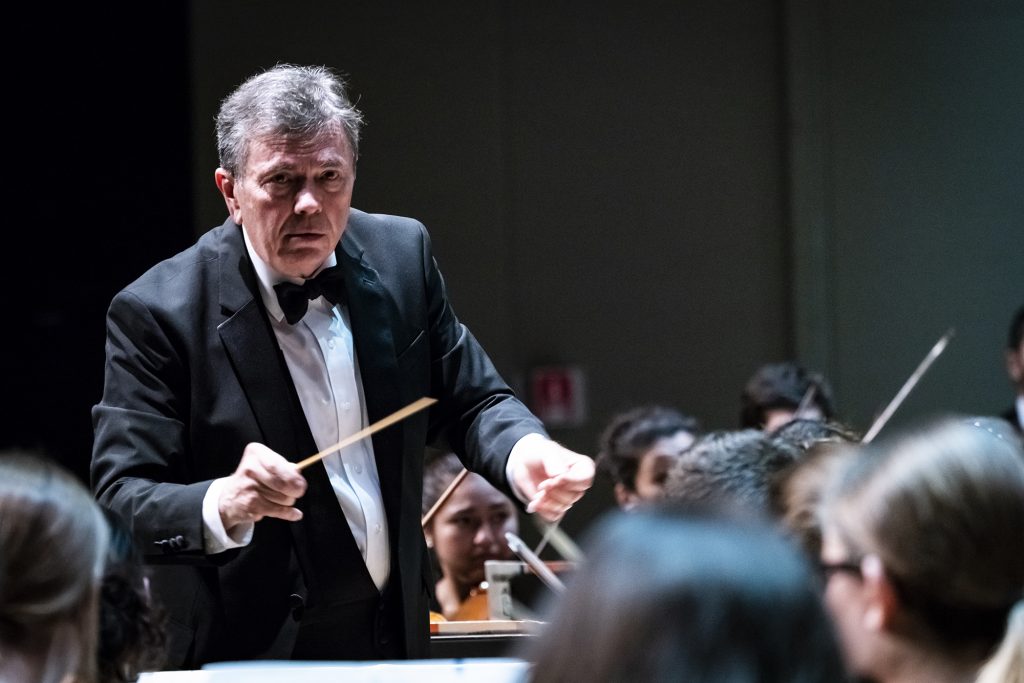Schwarz, Frost Symphony deliver seismic Mahler, in a concert dedicated to Thomas Sleeper

Gerard Schwarz conducted the Frost Symphony Orchestra in music of Mahler and Jennifer Higdon Saturday night.
The memory of Thomas Sleeper was the thematic thread woven through the concert by the Frost Symphony Orchestra on Saturday night at UM Gusman Hall. Although the program was planned well in advance of the death of the conductor-composer-educator-UM faculty member on October 15, the evening’s bill of fare perfectly encapsulated Sleeper—a recent work by a major contemporary composer and a challenging pillar of the standard symphonic repertoire.
Frost Dean Shelly Berg spoke of Sleeper’s artistic integrity and absolute dedication to his students, followed by Gerard Schwarz leading the ensemble in a moving performance of “Nimrod” from Elgar’s Enigma Variations. In acknowledging the applause, Schwarz pointed to a projected picture of Sleeper behind the orchestra.
Duo Duel for two percussionists and orchestra by Jennifer Higdon received its East Coast premiere. Jointly commissioned by the Frost School, Houston Symphony and Cabrillo Music Festival, the score is a tour de force for two very busy soloists. Replete with color and invention, this 25- minute concerto really rocks in the best sense of the term.
In the opening section, vibraphone and marimba lines tickle the ear as rhythmic figurations gradually come into play. Two violins take up an alluring melody and a pair of cadenzas challenge the percussionists in a contest of speed and dexterity. Switching to multiple timpani for the finale, the soloists duel with the ensemble to a dead heat, as orchestral salvos animate the percussive discourse. Higdon has created a tantalizing amalgam of Americana, jazz and minimalism that is a major addition to the percussion repertoire.
Higdon could not have wished for a better or more scrupulous performance. Frost faculty member Svet Stoyanov and Matthew Strauss, associate principal timpanist of the Houston Symphony, were incredibly agile, playing with unanimity even at the fiercest clip. They could modulate down to the softest tap, their echo effects deftly timed. Alternately making their instruments sing and pound furiously, Stoyanov and Strauss exhibited total mastery.
Schwarz has long been a specialist at contemporary music, and he drew brilliant playing from the student forces. Strings gleamed and brasses roared in rousing fashion. Higdon, Stoyanov, Strauss and Schwarz received cheers and repeated curtain calls from an enthusiastic audience.
Mahler’s Symphony No. 1 in D Major is no small challenge for any orchestra. Like Sleeper before him, Schwarz displays that unique ability to draw remarkable performances from students that exceed expectations. He is also an outstanding Mahler interpreter, as demonstrated by his searing traversal of Mahler’s Sixth Symphony, one of the most memorable concerts of last season.
Schwarz evoked the mystery of Mahler’s nature painting in the symphony’s opening pages. Over pianissimo strings, the sound of cuckoos emerged in transparent winds, as Alpine horn calls and three off-stage trumpets provided atmosphere. Schwarz’s taut pacing captured both the folk-tinted influences of the main melody and darker subtext of the first movement. He eschewed genteel smoothness for rustic abandon in the second movement, conjuring up a country dance. Portamento strings slides embellished the incisive and unified articulation.
The double-bass solo resounded more like a cello in warmth at the onset of the Frere Jacques theme in the funeral march. Unbridled klezmer intonations evoked a real village band. The transition to the finale came off with cataclysmic force and power. Schwarz built the climaxes in layers, the music proceeding inexorably toward the final joyous outburst. Instrumental lines had striking clarity, including the crucial harp part. The Eight horns stood for the sonorous conclusion, delivered with massive impact.
The performance ran the full dynamic range from hushed stillness to tumultuous sonic declamations. This Mahler First proved a tremendous achievement for Schwarz and the student musicians, as well as a fitting tribute to the memory of Thomas Sleeper.
Gerard Schwarz conducts the Frost Symphony Orchestra in Stravinsky’s Rite of Spring, Valerie Colemans 7 o’clock Shout and Beethoven’s Piano Concerto No. 3 with a concerto competition soloist, 8 p.m. December 3 at UM Gusman Hall in Coral Gables. music.miami.edu
Posted in Performances
One Response to “Schwarz, Frost Symphony deliver seismic Mahler, in a concert dedicated to Thomas Sleeper”
Leave a Comment
Sun Oct 30, 2022
at 2:14 pm
1 Comment
Posted Nov 01, 2022 at 1:30 pm by Chris Brown
Great review of the concert. It was well done!